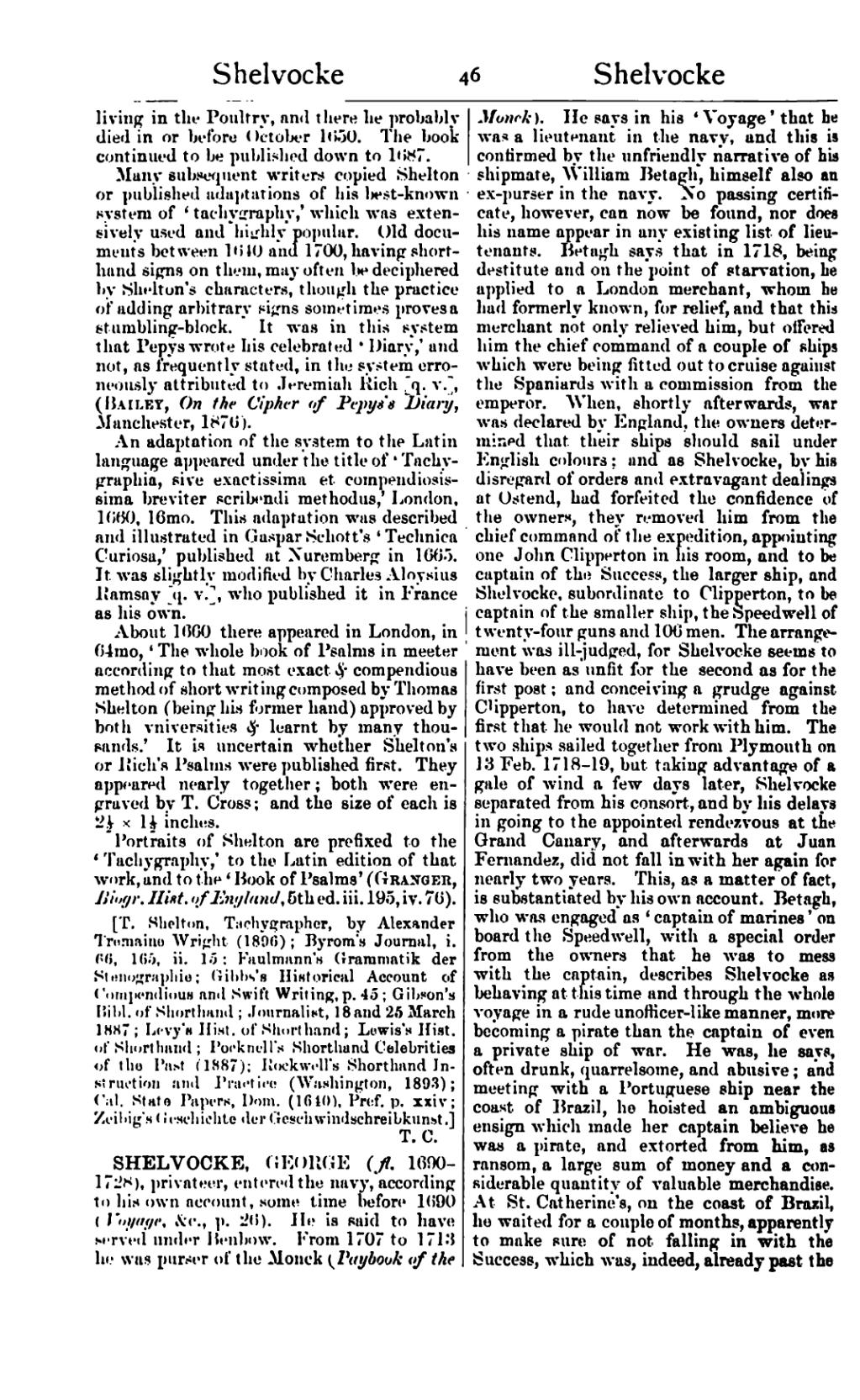living in the Poultry, and there he probably died in or before October 1650. The book continued to be published down to 1687.
Many subsequent writers copied Shelton or published adaptations of his best-known system of ‘tachygraphy,’ which was extensively used and highly popular. Old documents between 1640 and 1700, having shorthand signs on them, may often be deciphered by Shelton's characters, though the practice of adding arbitrary signs sometimes proves a stumbling-block. It was in this system that Pepys wrote his celebrated ‘Diary,’ and not, as frequently stated, in the system erroneously attributed to Jeremiah Rich [q. v.], (Bailey, On the Cipher of Pepys's Diary, Manchester, 1876).
An adaptation of the system to the Latin language appeared under the title of ‘Tachygraphia, sive exactissima et compendiosissima breviter scribendi methodus,’ London, 1660, 16mo. This adaptation was described and illustrated in Gaspar Schott's ‘Technica Curiosa,’ published at Nuremberg in 1665. It was slightly modified by Charles Aloysius Ramsay [q. v.], who published it in France as his own.
About 1660 there appeared in London, in 64mo, ‘The whole book of Psalms in meeter according to that most exact & compendious method of short writing composed by Thomas Shelton (being his former hand) approved by both vniversities & learnt by many thousands.’ It is uncertain whether Shelton's or Rich's Psalms were published first. They appeared nearly together; both were engraved by T. Cross; and the size of each is 2½ × 1½ inches.
Portraits of Shelton are prefixed to the ‘Tachygraphy,’ to the Latin edition of that work, and to the ‘Book of Psalms’ (Granger, Biogr. Hist. of England, 5th ed. iii. 195, iv. 76).
[T. Shelton, Tachygrapher, by Alexander Tremaine Wright (1896); Byrom's Journal, i. 66, 165, ii. 15; Faulmann's Grammatik der Stenographie; Gibbs's Historical Account of Compendious and Swift Writing, p. 45; Gibson's Bibl. of Shorthand; Journalist, 18 and 25 March 1887; Levy's Hist. of Shorthand; Lewis's Hist. of Shorthand; Pocknell's Shorthand Celebrities of the Past (1887); Rockwell's Shorthand Instruction and Practice (Washington, 1893); Cal. State Papers, Dom. (1640), Pref. p. xxiv; Zeibig's Geschichte der Geschwindschreibkunst.]
SHELVOCKE, GEORGE (fl. 1690–1728), privateer, entered the navy, according to his own account, some time before 1690 (Voyage, &c., p. 26). He is said to have served under Benbow. From 1707 to 1713 he was purser of the Monck (Paybook of the Monck). He says in his ‘Voyage’ that he was a lieutenant in the navy, and this is confirmed by the unfriendly narrative of his shipmate, William Betagh, himself also an ex-purser in the navy. No passing certificate, however, can now be found, nor does his name appear in any existing list of lieutenants. Betagh says that in 1718, being destitute and on the point of starvation, he applied to a London merchant, whom he had formerly known, for relief, and that this merchant not only relieved him, but offered him the chief command of a couple of ships which were being fitted out to cruise against the Spaniards with a commission from the emperor. When, shortly afterwards, war was declared by England, the owners determined that their ships should sail under English colours; and as Shelvocke, by his disregard of orders and extravagant dealings at Ostend, had forfeited the confidence of the owners, they removed him from the chief command of the expedition, appointing one John Clipperton in his room, and to be captain of the Success, the larger ship, and Shelvocke, subordinate to Clipperton, to be captain of the smaller ship, the Speedwell of twenty-four guns and 106 men. The arrangement was ill-judged, for Shelvocke seems to have been as unfit for the second as for the first post; and conceiving a grudge against Clipperton, to have determined from the first that he would not work with him. The two ships sailed together from Plymouth on 13 Feb. 1718–19, but taking advantage of a gale of wind a few days later, Shelvocke separated from his consort, and by his delays in going to the appointed rendezvous at the Grand Canary, and afterwards at Juan Fernandez, did not fall in with her again for nearly two years. This, as a matter of fact, is substantiated by his own account. Betagh, who was engaged as ‘captain of marines’ on board the Speedwell, with a special order from the owners that he was to mess with the captain, describes Shelvocke as behaving at this time and through the whole voyage in a rude unofficer-like manner, more becoming a pirate than the captain of even a private ship of war. He was, he says, often drunk, quarrelsome, and abusive; and meeting with a Portuguese ship near the coast of Brazil, he hoisted an ambiguous ensign which made her captain believe he was a pirate, and extorted from him, as ransom, a large sum of money and a considerable quantity of valuable merchandise. At St. Catherine's, on the coast of Brazil, he waited for a couple of months, apparently to make sure of not falling in with the Success, which was, indeed, already past the
